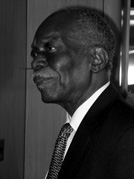 |

Comment
on this story
What:
Pianist Hank Jones with the Knoxville Jazz Orchestra
When:
Tuesday, April 27, 8 p.m.
Where:
Bijou Theater
Cost:
$25
|
Playing with Time
Jazz pianist Hank Jones is an ageless wonder
by Mike Gibson
When asked to enumerate some of his career highlights, venerable jazz pianist Hank Jones instead chuckles good-naturedly and recalls a story about a blind musician of his acquaintance.
“Someone asked him ‘Have you been blind all your life? His response was ‘No, not yet,’” says Jones, in a recent phone interview from a Manhattan hotel room. “And that’s pretty much the way I feel about it. Telling you ‘these are the high points of my career’ tends to imply my career is over. And I certainly don’t believe that it is.”
Indeed, Jones seems no closer to retirement than most men half his age. At 85, he just completed a new compact disc, to be released this year on the Canada-based jazz label Justin Time Records; and he is active as a performer, touring and sometimes playing five and six club dates a week in his home state of New York.
Even a life-threatening aortic aneurysm suffered in late 2002 couldn’t keep the irrepressible Jones out of commission for long; after several months of relative inactivity, Jones quickly regained his pianistic facility, if not the full measure of his astonishing physical energy.
“Before the aneurysm, I used to love to walk five, 10, 15 miles at a time,” Jones sighs. “I can’t do that now. But I’m gradually getting back to a full schedule, adding more dates in performance. It’s coming back to me, and I’m enjoying it.”
The oldest of three great jazz-playing siblings (his late brother Thad was a trumpeter and composer; brother Elvin is a drummer and former protégé of tenor sax icon John Coltrane), Jones played his first semi-professional gigs at the tender age of 13, as a schoolboy in Michigan.
Profoundly moved by older jazz piano titans such as Fats Waller, Art Tatum and Teddy Wilson, Jones would go on to meld the ragtime and swing influence of those players with the burgeoning bebop movement spearheaded by horn players like Charlie Parker and Dizzie Gillespie in the 1940s. His blend of more traditional swing and the harmonically adventurous new bebop helped define what critics now refer to as the Detroit piano school, a generation of stylists that included greats such as Tommy Flanagan, Barry Harris, and Sir Roland Harris.
Though he never attained the same wider recognition as his brother Elvin, Jones is nonetheless revered within the jazz community itself. His professional resume reads like a Who’s Who of jazz; he accompanied the likes of Parker, singer Ella Fitzgerald, horn players Lester Young and Cannonball Adderly both live and on LP, and has performed on literally thousands of recordings all told.
In 1959, Jones joined the staff of CBS Studios, playing for countless radio and TV broadcasts in his career; he would later serve as a conductor and pianist for the Broadway musical Ain’t Misbehavin’ in the late 1970s.
“I’ve had the good fortune of playing with the greatest players of the day—Coleman Hawkins, Lester Young, Charlie Parker, all in their prime,” Jones says. “Even today, those players still mean the most to me; they are the ones I understand, who are coming from the same place I am harmonically. I still have loads of their records, and I still listen to them all the time.”
He says one of the great regrets of his career is that the three Jones siblings rarely played on the same recording or shared the same stage before Thad died in 1986 at the age of 63. Hank and brother Elvin appeared together on the trio recording Autumn Leaves in 2003, but opportunities for collaboration are still infrequent.
“I do wish the three of us had gotten together more often,” Jones says. “But it’s sometimes hard to reconcile your schedules when you’ve got three people and three separate careers.”
Jones admits he’s not enamored of the freer bent of much modern improvisation: “For me, anything that is considered music has to have some form, some harmonic structure... If it’s too loose, there’s nothing to relate to, nothing to hang your hat on.”
At the same time, Jones is one old dog who is yet willing to learn new tricks. A life-long student of the piano, even in the eighth decade of his career, Jones still seeks out new teachers to hone his harmonic knowledge, or shore up his keyboard technique.
“I still need refresher courses,” Jones says. “There are always things that maybe slipped by you on the way up. I guess the common perception of people in their 80s is that we’re through learning and growing. We’re just old, decrepit folks who walk with a cane. But I feel like I’ve got several years left.”
Then Jones adds with a laugh, though maybe not in jest, “I’m shooting for maybe 150 or 200 years old.”

April 22, 2004 • Vol. 14, No. 17
© 2004 Metro Pulse
|
|